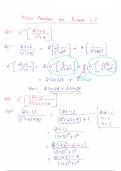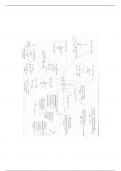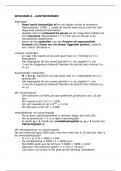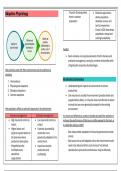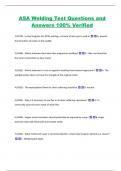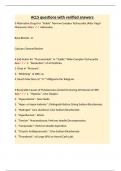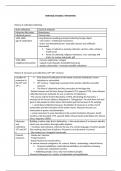2.1 Thinking and Remembering
Cognitive Psychology
Veerle Fransen
Pages Literature Type
1 Analysing Papers Structure
2-3 Lecture 1: Introduction
3-6 Problem 1: Where’s Your Head At?
7-10 Problem 2: A Ballad To Forget
10-14 Lecture 2: Malleability of Memory
14-19 Problem 3: Can’t get you out of my Head
20-24 Problem 4: Concepts
25-27 Lecture 3: Embodied Cognition
28-31 Problem 5: Conversation Intercom
32-34 Lecture 4: Making Decisions
35-38 Problem 6: Mental Imagery
39-43 Problem 7: Decision making
44-46 Lecture 5: Cognitive systems
46-48 Problem 8: Problem Solving
,Analysing the articles
Abstract
• Is it clear what the study was about?
Introduction
• What are the basic concepts?
• What is the research question?
• What theories and results of other research projects form the basis of the research question?
• What are the hypotheses?
Method
• Who were the participants?
• What are the dependent and independent variables of the research?
• For dependent variables: Were they quantitative or qualitative variables?
• For independent variables: Were they realized between or within subjects? Were they manipulated or
observed?
• In case of a between-subjects set-up: How were the people assigned to the conditions (were they
assigned randomly)?
• How was the research carried out?
• For all of the above questions, ask yourself why the researchers made the choices they did.
Results
• What type of statistical test was applied?
• Can you interpret the p-values and effect sizes?
• Do the results support the hypotheses?
• Make sure that you are able to relate the content of tables and figures to the outcome of the statistical
test(s).
Discussion
• Do the results support the hypotheses? If so, how? If not, why not?
Conclusion
• Can you state the central conclusion of the research in one sentence?
1
,Lecture 1: Introduction
Information processing Model
By Atkinson & Shiffrin (1968)
− Humans are active information processors
− Idea is modelled after computer: we are a
machine that receives input, that is processed
and then stored
− Information is either forgotten or progresses to
the next stage
− We have a limited capacity, so we forget
everything and focus on the most important
information → Ex. gorilla effect
− Attention= Mental resource→ we need to focus on something to be able to do it well
2 types of information streams:
− Bottom-up attention= some aspects of a scene automatically draw our attention
→ the yellow duck between other black ducks
− Top-down attention= for others we must pay attention
→ the green turtle hidden between green watermelons
2 types of attention
− Selective attention= one source of information is attended to while the other is blocked out.
o Sustained attention= the level of continued attention to one topic
− Divided attention= multitasking= impossible so we task switch
o we can learn this! Ex. Alternating runs paradigm= task alternates every N trials. We get better
the more we practice. → see reading speech test.
− We remember words better when there is a higher value added to it
− Unfamiliar study music distracts less than familiar music
2
, When switching tasks:
1. Switch cost= the time lost every time you switch from one task to another→ when you
switch between tasks doing the tasks takes longer than if you were doing a repeated task
(because you need a little time to get used to doing a different kind of exercise)
!= difference in a switch trial in which one task is repeated vs. a new task comes in
2. Preparation effect= if we give information in advance to the upcoming changed task, the
average switch cost (different between the task done and new task) is reduced
3. Residual cost= even when we prepare there is a small switch cost (its just smaller)
4. Mixing cost= the cost of you reacting slower because you are mixing multiple tasks
instead of just one
! Mixing cost= difference in doing non-switch trial vs task switch trial
o Smartphones:
− Mobiles disrupt classroom learning and studying
− Smartphone induced brain-drain= even when students try to ignore the phone, the ignoring
of notification, ignoring temptation takes up energy and attention
o 2.5% of people can perform cognitive tasks without impairing driving
→ distracted driving associated with 26% of all crashes.
→ hands -free phone are just as disruptive as handled phones
3
Cognitive Psychology
Veerle Fransen
Pages Literature Type
1 Analysing Papers Structure
2-3 Lecture 1: Introduction
3-6 Problem 1: Where’s Your Head At?
7-10 Problem 2: A Ballad To Forget
10-14 Lecture 2: Malleability of Memory
14-19 Problem 3: Can’t get you out of my Head
20-24 Problem 4: Concepts
25-27 Lecture 3: Embodied Cognition
28-31 Problem 5: Conversation Intercom
32-34 Lecture 4: Making Decisions
35-38 Problem 6: Mental Imagery
39-43 Problem 7: Decision making
44-46 Lecture 5: Cognitive systems
46-48 Problem 8: Problem Solving
,Analysing the articles
Abstract
• Is it clear what the study was about?
Introduction
• What are the basic concepts?
• What is the research question?
• What theories and results of other research projects form the basis of the research question?
• What are the hypotheses?
Method
• Who were the participants?
• What are the dependent and independent variables of the research?
• For dependent variables: Were they quantitative or qualitative variables?
• For independent variables: Were they realized between or within subjects? Were they manipulated or
observed?
• In case of a between-subjects set-up: How were the people assigned to the conditions (were they
assigned randomly)?
• How was the research carried out?
• For all of the above questions, ask yourself why the researchers made the choices they did.
Results
• What type of statistical test was applied?
• Can you interpret the p-values and effect sizes?
• Do the results support the hypotheses?
• Make sure that you are able to relate the content of tables and figures to the outcome of the statistical
test(s).
Discussion
• Do the results support the hypotheses? If so, how? If not, why not?
Conclusion
• Can you state the central conclusion of the research in one sentence?
1
,Lecture 1: Introduction
Information processing Model
By Atkinson & Shiffrin (1968)
− Humans are active information processors
− Idea is modelled after computer: we are a
machine that receives input, that is processed
and then stored
− Information is either forgotten or progresses to
the next stage
− We have a limited capacity, so we forget
everything and focus on the most important
information → Ex. gorilla effect
− Attention= Mental resource→ we need to focus on something to be able to do it well
2 types of information streams:
− Bottom-up attention= some aspects of a scene automatically draw our attention
→ the yellow duck between other black ducks
− Top-down attention= for others we must pay attention
→ the green turtle hidden between green watermelons
2 types of attention
− Selective attention= one source of information is attended to while the other is blocked out.
o Sustained attention= the level of continued attention to one topic
− Divided attention= multitasking= impossible so we task switch
o we can learn this! Ex. Alternating runs paradigm= task alternates every N trials. We get better
the more we practice. → see reading speech test.
− We remember words better when there is a higher value added to it
− Unfamiliar study music distracts less than familiar music
2
, When switching tasks:
1. Switch cost= the time lost every time you switch from one task to another→ when you
switch between tasks doing the tasks takes longer than if you were doing a repeated task
(because you need a little time to get used to doing a different kind of exercise)
!= difference in a switch trial in which one task is repeated vs. a new task comes in
2. Preparation effect= if we give information in advance to the upcoming changed task, the
average switch cost (different between the task done and new task) is reduced
3. Residual cost= even when we prepare there is a small switch cost (its just smaller)
4. Mixing cost= the cost of you reacting slower because you are mixing multiple tasks
instead of just one
! Mixing cost= difference in doing non-switch trial vs task switch trial
o Smartphones:
− Mobiles disrupt classroom learning and studying
− Smartphone induced brain-drain= even when students try to ignore the phone, the ignoring
of notification, ignoring temptation takes up energy and attention
o 2.5% of people can perform cognitive tasks without impairing driving
→ distracted driving associated with 26% of all crashes.
→ hands -free phone are just as disruptive as handled phones
3

